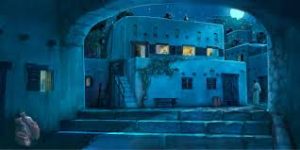The Upper Room Discourse
About 10:00 pm on Friday Evening

Time was running short. In the Upper Room Jesus gave His final instructions to His eleven talmidim. He would be leaving them to go to a place they could not follow. The bulk of Yeshua’s teaching here is in response to four different specific questions asked by Peter, Thomas, Philip and Thaddaeus. It was getting close to 10 pm and Caiaphas waited for Pontius Pilate outside the double gates of his headquarters. He was impatient. Very impatient. This thing that had to be done needed to be completed at once and quietly. But to avoid ceremonial uncleanness Caiaphas and the chief of the Temple guard did not enter the praetorium because they did not want to be defiled. So, reluctantly, Pilate came out to them and asked them what they wanted. The two men needed each other to survive their uneasy peace. So the willingness of the two schemers tended to cancel each other out evenly. Each understood the strategic treachery of the other. Each understood that this Nazarene was a pawn in a much bigger game. The fight was over power. Caiaphas and Annas for the retention of power in Jerusalem – and Pilate to bring the Jews to heel.
According to Roman law, Judas needed to be present to make the accusation. So the high priest called Judas to his side and watched the money-keeper’s great deference with scorn. Caiaphas was shrewd. He knew that if Judas would actually live with someone who claimed to be the Messiah and then betray him for next to nothing, then Judas, if given the opportunity, would betray the high priest for an even smaller sum.
Caiaphas had to think of all the possibilities. He ordered Judas to lead the arresting party to the house of the feast, and to make sure that he pointed out the right man to the Roman soldiers. He envisioned some confusion when the raid was in progress, and he did not want the Nazarene to escape. If he slipped through the net tonight, he might flee to Galilee or the wilderness and not be seen in Tziyon again until the high holy days of the autumn.
Moreover, the high priest did not want to arrest Jesus’ followers this night. They were merely sheep and would scatter at the first sign of attack on the shepherd. He had instructed the chief of the Temple guard only to threaten them with arrest. That would be enough. Roman law must be followed and he wanted only one person to be judged. It would be far better if the small band were able to tell His followers that He had been arrested, tried and convicted of blasphemy. Then this new cult would die out, the people would return to worship at the Temple where they belonged and this nightmare would be over at last.
Judas said that the Passover feast would probably continue for another hour or so. It should be simple enough to surround the house and to send a raiding party up the outside stairs – there was no other exit – and then he would lead a detachment of soldiers into the room to arrest Him.
Exploring all the possibilities, Caiaphas had demanded an alternate plan apart from Judas’ if Jesus had escaped from the upper room. He asked Judas where the most likely places to find him would be. The betrayer said that the renegade rabbi would probably go to the garden of Gethsemane at the foot of the Mount of Olives, because when Yeshua was in Jerusalem he often slept there with his men. Should he not be there, the soldiers should go to Bethany to the home of Martha and Mary, because that was the only other place Jesus would sleep. And as Bethany was only three miles from where the high priest stood, the arrest could be made long before dawn and the awakening of the City.
Caiaphas was pleased. So long as the criminal was surely in either the Upper Room, Gethsemane or the home of Martha and Mary, there was little cause to worry. It would, of course, simplify everything if Jesus was caught in the Upper Room, resist arrest, and receive a Roman spear through the heart as a result. This would take the onus off of him and the Sanhedrin. The thousands of followers of Jesus in and around Jerusalem could then spew their venom on the Romans, an ideal situation for the high priest.
Still, resistance was hardly to be expected, unless the Jewish leaders had read their man incorrectly. The counterfeit Messiah preached love, non-violence and forgiveness. Thus, these traits did not lend themselves to an early morning brawl with Roman soldiers. But Pilate’s gesture of sending a cohort of soldiers may have been an act of deliberate sarcasm. It was like sending a major general and two brigades to apprehend a child.1420
The procurator and Caiaphas had already agreed on a plan (to see link click Kk – The Third Cup of Redemption). The Roman cohort would leave Fortress Antonia and meet the Temple guard at the home of the high priest. From there they would travel a few blocks to the south and take the troublemaking Rabbi into custody. If He wasn’t in the Upper Room, they knew where to look next.



Leave A Comment